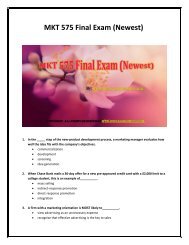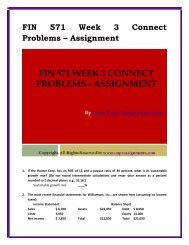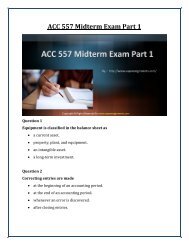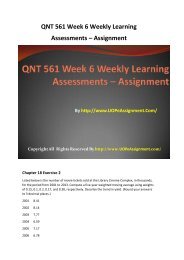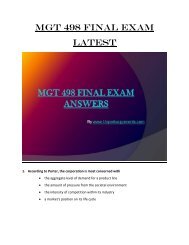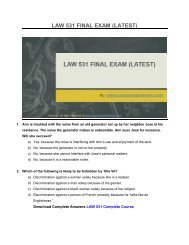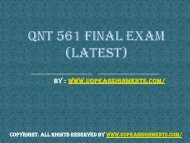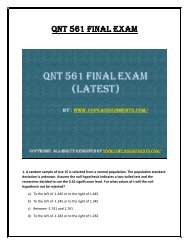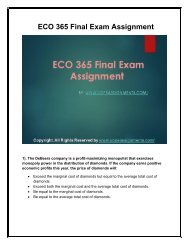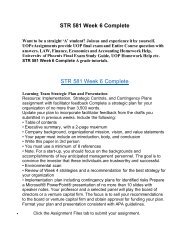Business LAW 531 Week 6 Final Exam New Assignments
Correct answers are just a click away. Get instant help and 100% correct answers to Business LAW 531 Week 6 Final Exam New Assignments 24x7 from learned professionals in statistics and other relevant fields.
Correct answers are just a click away. Get instant help and 100% correct answers to Business LAW 531 Week 6 Final Exam New Assignments 24x7 from learned professionals in statistics and other relevant fields.
Create successful ePaper yourself
Turn your PDF publications into a flip-book with our unique Google optimized e-Paper software.
decision that cost them billions. However, Ted had made a reasonable investigation<br />
before making this decision, he had a rational basis for it, and he had no conflicts of<br />
interest regarding this decision. What would be the probable outcome if the shareholders<br />
file a suit?<br />
a) Ted is liable under the ultra vires rule.<br />
b) Ted is liable under the various liability rule.<br />
c) Ted is not liable under the corporate protection rule.<br />
d) Ted is not liable under the business judgment rule.<br />
18. Which of the following is also called “judgemade” law?<br />
a) Statutes<br />
b) Equity<br />
c) Uniform acts<br />
d) Common law<br />
Want to download the Complete Answer..?? Click <strong>LAW</strong> <strong>531</strong> <strong>Week</strong> 3 IRAC Brief<br />
19. Reggie went to the Napa Valley Harvest Festival, when he stopped at Tracy’s booth<br />
where she was selling paintings of vineyards. Reggie admired a painting of vineyards<br />
that did not appear to be for sale. Reggie said to Tracy, “I will give you $200 for that<br />
painting right now.” Tracy said nothing in response but she gave Reggie the painting,<br />
and Reggie gave her $200 in cash. This is an example of a contract that is now _____.<br />
a) unilateral and executory<br />
b) bilateral and executory<br />
c) bilateral and executed<br />
d) unilateral and executed<br />
20. Under the doctrine of federal jurisdiction, a corporation is:<br />
a) A citizen of only the place where it has been incorporated.<br />
b) A citizen of only the state where it has its principal place of business.<br />
c) A citizen of that state which has enacted a “long arm” statute and thus has jurisdiction.<br />
d) A citizen of both its place of incorporation and the state where it has its principal place of<br />
business.<br />
Answers To <strong>LAW</strong> <strong>531</strong> <strong>Final</strong> <strong>Exam</strong> Free Essays <strong>LAW</strong> <strong>531</strong> <strong>Week</strong> 4 IRAC Brief




